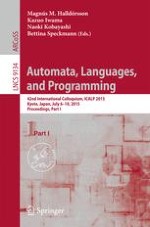
2015 | OriginalPaper | Buchkapitel
Statistical Randomized Encodings: A Complexity Theoretic View
verfasst von : Shweta Agrawal, Yuval Ishai, Dakshita Khurana, Anat Paskin-Cherniavsky
Erschienen in: Automata, Languages, and Programming
Verlag: Springer Berlin Heidelberg
Aktivieren Sie unsere intelligente Suche, um passende Fachinhalte oder Patente zu finden.
Wählen Sie Textabschnitte aus um mit Künstlicher Intelligenz passenden Patente zu finden. powered by
Markieren Sie Textabschnitte, um KI-gestützt weitere passende Inhalte zu finden. powered by
A randomized encoding of a function
f
(
x
) is a randomized function
$$\hat{f}(x,r)$$
f
^
(
x
,
r
)
, such that the “encoding”
$$\hat{f}(x,r)$$
f
^
(
x
,
r
)
reveals
f
(
x
) and essentially no additional information about
x
. Randomized encodings of functions have found many applications in different areas of cryptography, including secure multiparty computation, efficient parallel cryptography, and verifiable computation.
We initiate a complexity-theoretic study of the class
$$\mathsf {SRE} $$
SRE
of languages (or boolean functions) that admit an efficient statistical randomized encoding. That is,
$$\hat{f}(x,r)$$
f
^
(
x
,
r
)
can be computed in time poly(|
x
|), and its output distribution on input
x
can be sampled in time poly(|
x
|) given
f
(
x
), up to a small statistical distance.
We obtain the following main results.
Separating
$$\mathsf {SRE} $$
SRE
from efficient computation:
We give the first examples of promise problems and languages in
$$\mathsf {SRE} $$
SRE
that are widely conjectured to lie outside
$$\mathsf {P/poly}$$
P
/
poly
. Our candidate promise problems and languages are based on the standard Learning with Errors (LWE) assumption, a non-standard variant of the Decisional Diffie Hellman (DDH) assumption and the “Abelian Subgroup Membership problem” (which generalizes Quadratic-Residuosity and a variant of DDH).
Separating
$$\mathsf {SZK} $$
SZK
from
$$\mathsf {SRE} $$
SRE
:
We explore the relationship of
$$\mathsf {SRE} $$
SRE
with the class
$$\mathsf {SZK} $$
SZK
of problems possessing statistical zero knowledge proofs. It is known that
$$\mathsf {SRE} \subseteq \mathsf {SZK} $$
SRE
⊆
SZK
. We present an oracle separation which demonstrates that a containment of
$$\mathsf {SZK} $$
SZK
in
$$\mathsf {SRE} $$
SRE
cannot be proved via relativizing techniques.